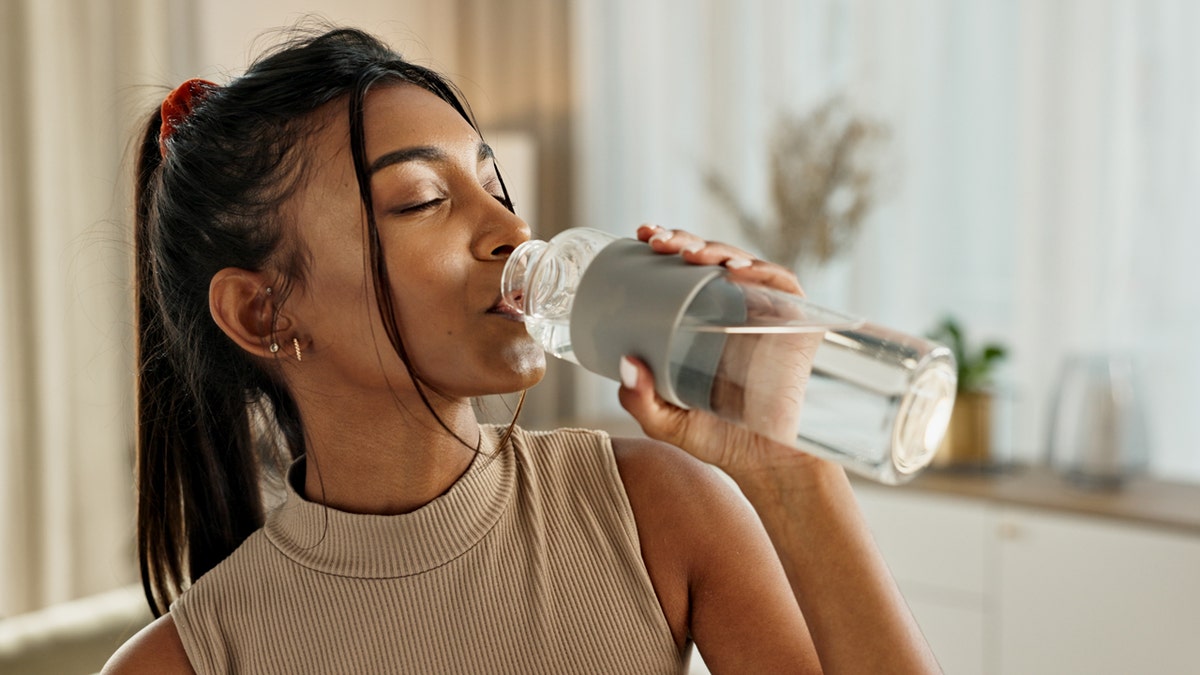NEWYou can now listen to articles!
A new study found that hydration is key when it comes to managing stress.
People who drink less than seven cups, or 1.5 liters, of water per day have a cortisol response to stress that is 50% higher than those who meet water intake recommendations.
Researchers at Liverpool John Moores University (LJMU) published the study in the Journal of Applied Physiology.
WEARABLE HYDRATION MONITOR COULD HELP PREVENT HEATSTROKE, SCIENTISTS SAY
Out of 62 healthy males and females, 32 participants were selected with both habitual low fluid intake and habitual high fluid intake.
Subjects who typically drank less than 1.5 liters of fluid per day were considered the “low-fluid” group, while the “high-fluid” group comprised people who drank the recommended amount of two liters for women and 2.5 for men.
New study reveals people drinking less than 1.5 liters of water daily show 50% higher cortisol stress responses than those meeting hydration recommendations. (iStock)
The participants’ fluid intake was monitored over seven days by testing the Trier Social Stress Test (TSST) and hydration markers with blood and urine.
The study found that drinking too little water increased stress-related health issues for both men and women.
Professor Neil Walsh, study lead at LJMU’s School of Sport and Exercise Sciences, said in a press release that keeping a water bottle nearby during stress-related times can have potential benefits for your long-term health.
‘HYDRATION BOOSTERS’ OR JUST WATER? MEDICAL EXPERTS MAKE RECOMMENDATIONS FOR BEATING THE SUMMER HEAT
“Cortisol is the body’s primary stress hormone and exaggerated cortisol reactivity to stress is associated with an increased risk of heart disease, diabetes and depression,” said Walsh.
A study team member, Dr. Daniel Kashi, said in a release that “both groups felt equally anxious and experienced similar increases in heart rate during the stress test.”

An important observation was that poor hydration was associated with greater cortisol reactivity to the stress test. (iStock)
He added that “only the ‘low-fluid’ group showed a significant increase in saliva cortisol in response to the stress test.”
“Although the low-fluid group did not report being thirstier than the high fluid group, they had darker and more concentrated urine, clear signs of poor hydration,” said Kashi.
“An important observation was that poor hydration was associated with greater cortisol reactivity to the stress test. Exaggerated cortisol reactivity to stress has been associated with poor long-term health,” Kashi added.
CLICK HERE TO SIGN UP FOR OUR HEALTH NEWSLETTER
Long-term dehydration can lead to more serious health issues such as kidney damage and failure, anxiety and depression, heart problems, and diabetes, according to the Cleveland Clinic.
Dehydration triggers the release of the vasopressin hormone, which puts pressure on the kidneys, making it harder to concentrate urine and manage electrolyte balance.

Researchers suggest that monitoring urine color is a good way for people to check their hydration status. (iStock)
“Vasopressin also acts on the brain’s stress-response cent[er]” influencing where it can release of cortisol,” according to the LJMU release.
The release added, “This dual role [of] vasopressin helps maintain blood volume and electrolyte balance but also increases cortisol.”
While researchers found that water intake recommendations should be followed, additional research and further long-term studies are needed.
For more health articles, visit www.foxnews.com/health
Researchers suggest that monitoring urine color is a good way for people to check their hydration status.
Light yellow urine color typically indicates good hydration.
CLICK HERE TO GET THE APP
“Being hydrated may help your body manage stress more effectively,” he said.













